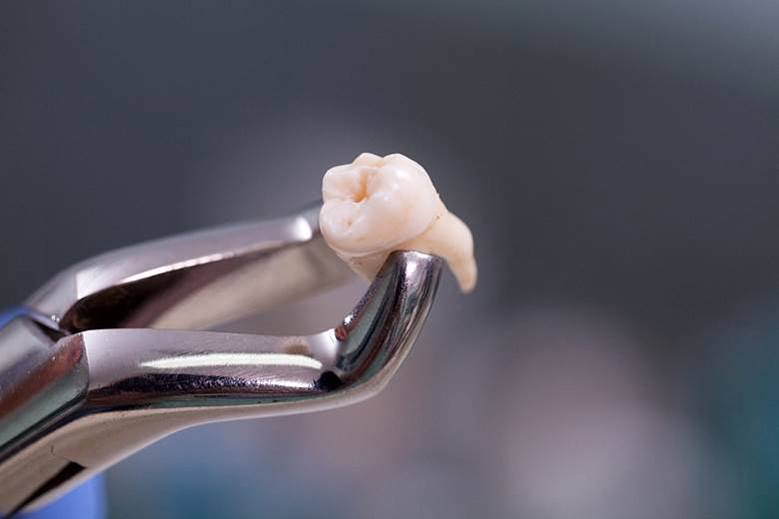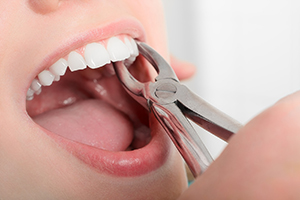Extracting teeth is never our first choice, but sometimes this is a necessary step in order to prevent oral health issues from developing and worsening in surrounding areas of the mouth. After all, keeping all of your natural teeth isn’t always the best idea, as teeth can become severely decayed, broken, or infected and lead to much more serious problems. At Rabbit Hill Family Dentistry, we can extract your damaged teeth to preserve your smile. To learn more about how you can say goodbye to problem teeth, contact our office!
Reasons Why Tooth Extractions Are Necessary

We always do everything we can to help our patients keep their natural teeth, but sometimes it simply isn’t the best option. Here are some of the situations where a tooth extraction may help to eliminate oral health issues and benefit the well-being of your smile:
- Ensuring the long-term success of a restoration, like dentures.
- When there is severe, irreparable damage to the tooth.
- If a primary tooth isn’t falling out on its own.
- When a tooth is impacted and not erupting properly.
- To allow for a patient to undergo orthodontic treatment.
By extracting teeth that are causing problems, future infections and other issues are significantly less likely to occur.
The Process of Removing a Tooth

We remove teeth by either pulling or surgical extraction. Teeth are only “pulled” when they have fully emerged from the gumline. In this case, we numb the area around your teeth and use a clasping tool to shift the tooth around until it is released from the gumline. If pulling isn’t an option, the tooth will need to be surgically extracted. For this procedure, a small incision is made in the gums to allow us the ability to reach enough of the tooth to remove it.
In order to determine which extraction method is right for you, schedule an appointment with us. This way, we can fully evaluate your situation. This is also a great time to talk about tooth replacement options to prevent future oral health issues that can occur as a result of tooth loss.
Tooth Extraction Aftercare

Before you head home from the practice after your extraction, we will provide you with a specific aftercare plan to help you stay comfortable and avoid complications. Everyone’s case is different, but here are some instructions that are generally recommended for optimal recovery:
- Take recommended over-the-counter and prescribed medications as directed.
- After an extraction, you will be asked to bite on a piece of gauze for about 20 to 30 minutes. This will put pressure on the area and allow the blood to clot.
- Use ice packs on your face to reduce swelling after the operation.
- If your jaw is sore and stiff after the swelling goes away, try a warm compress.
- Eat soft and cool foods for a few days and then try other foods as you feel comfortable.
- A gentle rinse with warm salt water, started 24 hours after the surgery, can also help to keep the area clean. Use one-half teaspoon of salt in one cup of water.
- You should not smoke, use a straw or spit after surgery.
- Get plenty of rest for optimal healing.
Tooth Extractions FAQs

While one of our main priorities is to preserve as many natural pearly whites as possible, this may not always be a viable option for preserving your oral health. If your dentist has recommended that you undergo a tooth extraction, you might want to know as much as you can about the treatment before starting anything. At Eguren Dentistry, we’re more than happy to answer any of your questions and have even compiled some of the most frequently asked ones from our patients. Read on or give us a call today to learn more about tooth extractions in Edmonton.
Does Getting a Tooth Removed Hurt?
Similar to most extensive dental procedures, our team will first completely numb your mouth before beginning your treatment. This way, you won’t feel any discomfort or pain throughout your appointment, other than mild pressure from the extraction itself. After your procedure, however, you might experience some soreness once the numbing effects wear off. This can easily be managed by following our specific aftercare guidelines, which should include using a cold compress on the outside of your cheek to alleviate swelling and taking over-the-counter or prescribed pain relievers as directed. If you notice any discomfort that worsens or experience symptoms of an infection, notify us right away.
What’s the Recovery Like for Tooth Extractions?
Once we’ve completed your tooth extraction, our team will provide you with a specific list of instructions on how to promote a smooth and speedy recovery. One crucial factor is that you’ll need to be cautious of the blood clot that forms at the surgical site, as this will be essential for your healing process. Failing to do so can lead to complications like dry socket, which is a painful condition that can increase the risk of infection. In most cases, patients can start brushing, flossing, and rinsing their mouths within three days of their procedure. Just be sure to gently wash your mouth until you feel better to keep the area clean of bacteria.
Can I Smoke After Getting a Tooth Extracted?
You should not smoke or use any tobacco products after tooth extraction. Not only will this increase your risk of bacteria, but it can also delay or interfere with your recovery process. While it’s best to quit this habit entirely, we do recommend that you at least avoid smoking for a couple of weeks after your procedure to allow your mouth to heal properly. If you need help kicking this habit to the curb, feel free to consult our team. We can provide the resources, guidance, and support necessary to help make this possible.
Is There an Alternative to a Tooth Extraction?
The only reason you might not require a tooth extraction is if preserving your tooth is a viable option. If you’re experiencing severe decay, but the tooth is still salvageable, then we might provide you with root canal therapy instead. Patients who are struggling with gum disease may simply need to undergo root scaling and planing instead of completely removing a tooth. Just remember that our team at Rabbit Hill Family Dentistry will only recommend tooth extraction as a last resort, and we’ll do everything we can to ensure you’re comfortable and pain-free while preserving your oral health.